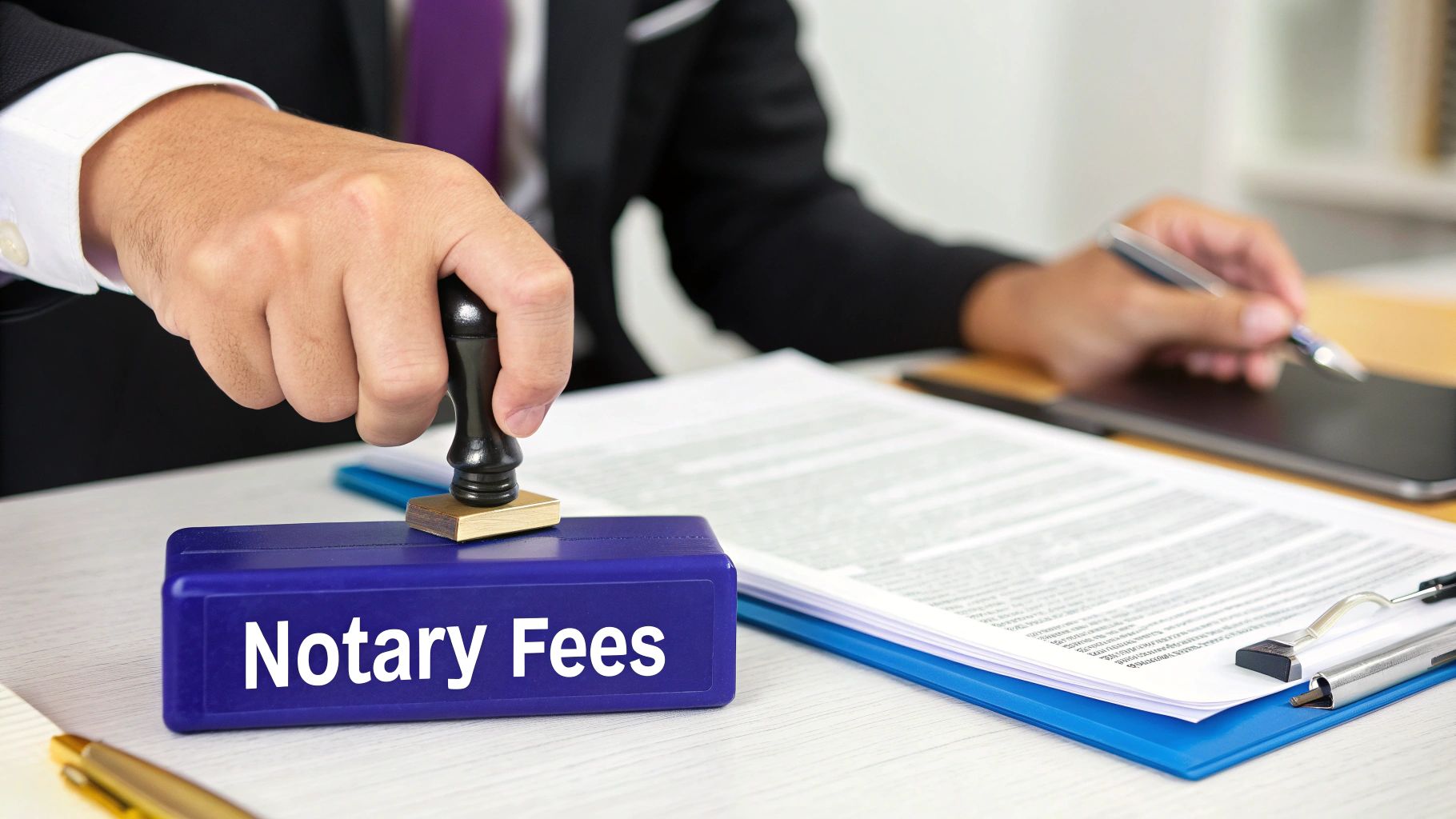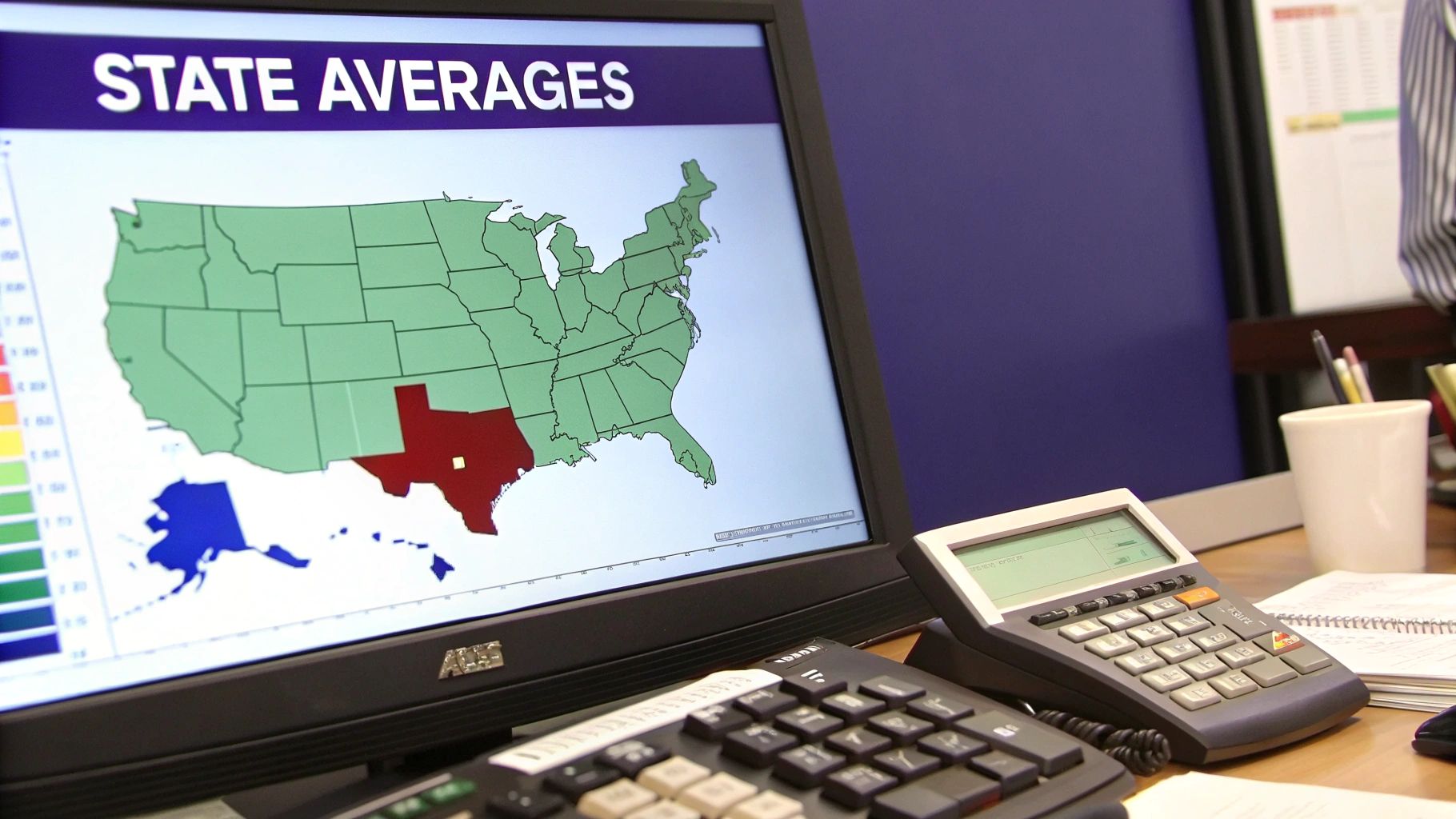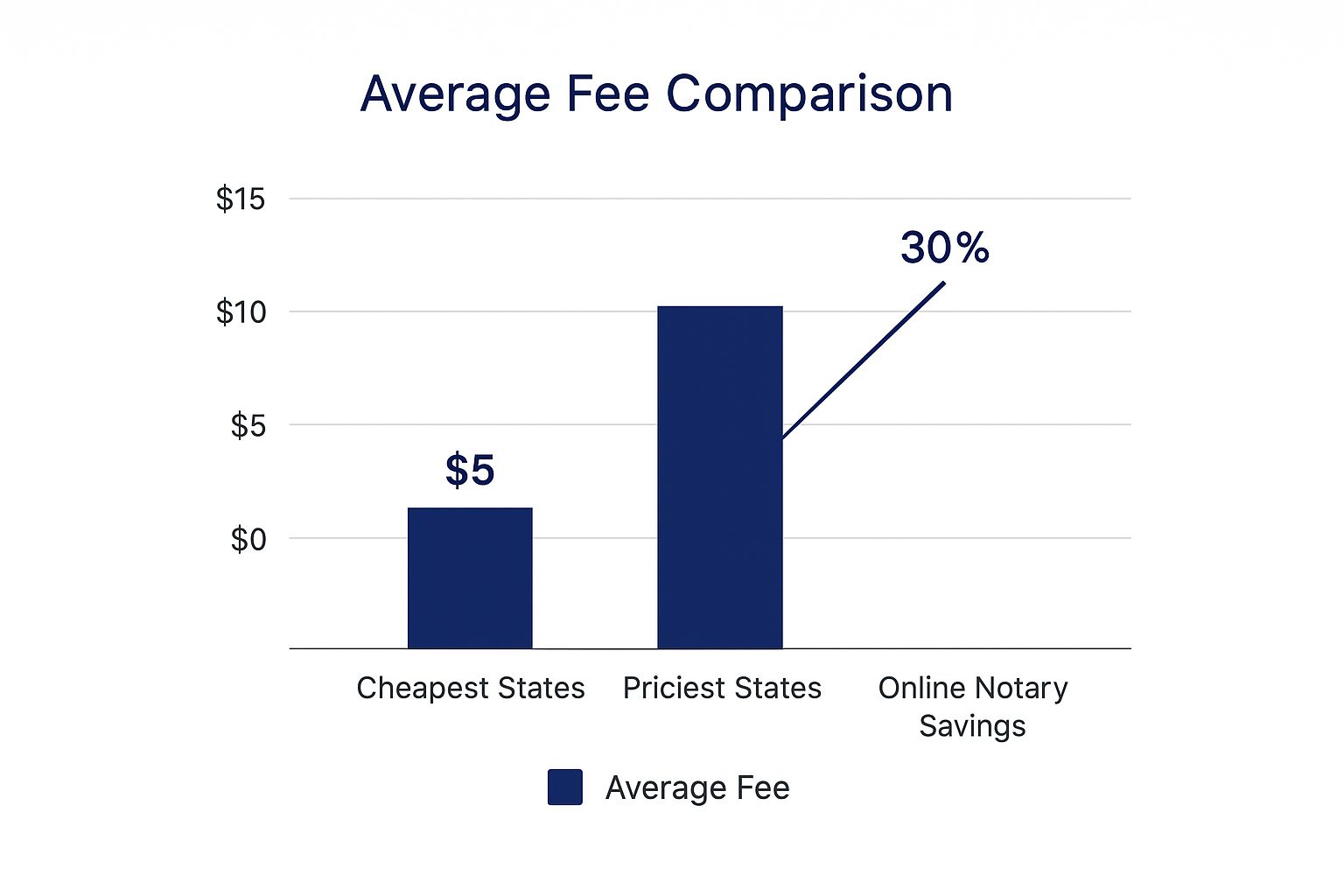How Much Are Notary Fees? Find Out Now!
- WebsiteFix Technical Partner
- Jul 14, 2025
- 13 min read
When you need a document notarized, the first question is usually, "How much is this going to cost?" For a basic, in-person notarization, you can typically expect to pay anywhere from $2 to $25 per signature.
This core fee is often set by state law, which helps keep the service affordable and predictable. But the number you see on the final invoice might be higher. It's a bit like ordering a pizza—the cheese pizza has a set price, but adding extra toppings or getting it delivered will naturally increase the total cost.
Understanding the Foundation of Notary Costs

When you ask about notary fees, you're really asking about two distinct parts of the total price. The first piece of the puzzle is the statutory fee. This is the maximum amount a notary is legally allowed to charge for performing a "notarial act," like witnessing a signature or administering an oath.
Think of this as the price ceiling for the core service itself. State governments regulate this fee to make sure notarizations remain accessible to the public without surprise costs.
State-by-State Fee Variations
There's no single, national price list for notary services in the United States. Instead, each state sets its own rules. For instance, in Florida and Alabama, a notary can charge up to $10 per notarial act. Head over to California, and that maximum jumps to $15.
Then you have states like Alaska and Arkansas, which don't set a maximum fee at all, leaving it up to the notary to set a reasonable price. You can dive deeper into these specific state-by-state fee structures to get a better handle on what you'll pay locally.
The most important thing to remember is that the base cost for a notarization isn't a flat rate across the country. It’s entirely dictated by the laws of the state where the notarization happens.
Added Services and Your Total Cost
The second part of the cost comes from any extra services you might need. These aren't regulated by the same state laws and are costs you and the notary agree upon beforehand. These often cover convenience and additional work.
Common extra charges include:
Travel Fees: If you're using a mobile notary who comes to your home, office, or a coffee shop.
Printing Fees: For situations where the notary has to print out a large document package for you.
After-Hours Surcharges: For appointments scheduled on evenings, weekends, or holidays.
Understanding this difference is key. The state-mandated fee covers the official act of notarizing, while the other charges cover the convenience and logistics that make it happen. Next, we’ll break down these fees so you have a complete picture of what to expect.
Typical Notary Fee Ranges at a Glance
To give you a quick reference point, here's a table summarizing the common fee structures you'll encounter.
Service Type | Typical Fee Range (Per Signature/Act) | Key Factors |
|---|---|---|
In-Person Notarization | $2 - $25 | The fee is set by state law. Some states have no set maximum. |
Mobile Notary | $25 - $150+ | Includes the state fee plus travel, time, and convenience charges. |
Remote Online Notarization | $25 - $85 | Includes the state fee plus technology platform and identity verification costs. |
Loan Signing Agent | $75 - $200+ | Flat fee for a package of documents, factoring in complexity and printing. |
Remember, these are general ranges. The final cost will always depend on your specific needs, your location, and the notary you choose.
Understanding What Shapes Notary Prices
Ever wondered why there's no single, flat fee for getting something notarized? It’s a great question, and the answer comes down to what you're actually paying for. The final cost isn't just one number; it’s a mix of a few key things working together: your state's laws, the specific service you need, and how many signatures are involved.
Think of it like getting work done on your car. The basic oil change has a set price, but if you also need new tires and a brake inspection, the total cost naturally goes up. Notary services work in a very similar way.
The Foundation: State-Mandated Fees
At the very core of every notary bill is the statutory fee. This is a specific dollar amount set by your state government, and it represents the maximum a notary can charge for a single notarial act, like witnessing a signature. These laws are in place to keep notarization affordable and accessible for everyone.
This fee is almost always calculated per signature, not per document. This is a crucial point many people miss. If you have a single document that needs signatures from three different people, you're actually asking for three separate notarizations. The notary is legally allowed to charge the maximum state fee for each one of those signatures.
Different Services, Different Costs
Not all notary services are created equal, and the specific "act" you need will play a part in the final price. It helps to think of it as a small menu of options, each with a different purpose.
Acknowledgments: This is the most common request. The signer simply acknowledges to the notary that they signed the document of their own free will.
Jurats: This one is a bit more involved. The signer has to swear or affirm under oath that the statements in the document are true. This requires the notary to formally administer that oath.
Oaths and Affirmations: Sometimes, you just need a notary to administer a verbal oath, with no document involved at all—like for a witness in a court deposition.
While many states have one standard fee that covers any of these basic acts, some have slight variations. The complexity matters, and it can be a small but real factor in the price you pay.
The key takeaway is this: The total cost is built in layers. It starts with the state-approved fee for one signature, and then it goes up with every extra signature and any special services you add on.
Once you understand these basic building blocks, you can look at any notary bill with confidence. Breaking it down into the fee-per-signature and the type of service performed shows you exactly where your money is going and ensures you're paying a fair price for a critical service.
The Real Cost of Mobile Notary Services

There's no denying the convenience of a mobile notary. They come to you—your home, your office, a coffee shop, even a hospital room. But this door-to-door service has a unique cost structure that's good to know about before you book. When you hire a mobile notary, you're paying for more than just a stamp and signature; you're paying for convenience delivered.
Your final bill is really a combination of two separate charges. The first is the standard notarial act fee, which is the price for the notarization itself. This part is usually regulated by state law. The second, and often bigger, part of the bill is the travel fee.
Deconstructing the Travel Fee
Think of the travel fee as the notary's charge for their time and logistics. While the fee for the actual notarization is often capped by the state, the travel fee usually isn't. This gives the notary the flexibility to set a rate that fairly compensates them for the time and expense of getting to you.
So, what goes into that fee? It’s more than just gas money.
Time: This isn't just the time spent with you. It's the entire round-trip, from the moment they leave their office until they get back.
Mileage and Vehicle Costs: This covers fuel, insurance, and the general wear and tear that comes with putting miles on a car for business.
Location-Specific Factors: Meeting at a high-security office building, a hospital, or a jail often involves extra time and hassle, which can be reflected in the fee.
Because these fees can vary so much from one notary to another, it's smart to ask for a full cost breakdown before you commit. A little transparency upfront prevents any surprises later. To learn more about how this works in practice, check out our guide on how mobile notaries make document signing easier.
A good practice is to always ask, "What is your travel fee, and how is it calculated?" Some notaries charge a flat rate within a certain radius, while others charge per mile.
Special Circumstances and Added Costs
Beyond a standard travel fee, a few other situations can add to your final cost. Need a notary on a Saturday, late at night, or on a holiday? Expect to pay an after-hours surcharge for that flexibility.
Likewise, if the notary has to wait around for a signer to show up or for you to get your documents in order, they may add a waiting fee. It’s always best to ask about these potential charges ahead of time so you know exactly what to expect.
This kind of convenience is in high demand. The global mobile notary service market was recently valued at USD 0.4 billion and is expected to keep growing.
How Remote Online Notarization (RON) is Priced
When you can't get to a notary in person, Remote Online Notarization (RON) is the modern answer. Instead of a physical meeting, you connect with a commissioned notary public over a secure video call. As you can imagine, this tech-first approach completely changes the pricing structure.
Unlike traditional notarizations where fees can be pieced together, RON services usually offer a simple, all-in-one price. Most of the time, you'll see a flat fee for the entire session, which typically lands right around $25. This single charge covers everything needed for a legally sound remote notarization, making the cost predictable and easy to understand.
What Does the RON Fee Include?
So, what’s packed into that flat fee? It helps to think of it not just as paying for a signature, but as paying for a complete service package. The fee accounts for the entire digital framework that makes the whole process secure, compliant, and convenient.
A single RON payment generally covers:
The Notarial Act: This is the core service—a commissioned notary witnessing your signature and applying their official electronic seal.
Technology Platform Fee: This covers the use of the specialized, secure software that hosts the video session and handles the digital documents.
Identity Verification: A critical security step. The platform uses advanced tools to confirm you are who you say you are, often through knowledge-based questions or analyzing your ID.
Secure Digital Storage: Many states require a video recording of the notarization to be stored securely, and this cost is built into the fee.
This bundled pricing is a big departure from in-person services, where you might pay a base fee plus extra for the notary's travel time or printing costs. You can learn more about the details in our guide to secure and convenient remote online notary services.
With RON, you’re paying for both the notarization itself and the secure technology that makes it all happen. The convenience of doing it from anywhere, along with the robust security, is baked right into the price.
This blend of convenience and security is fueling some serious growth. The RON service market was recently valued at around USD 101 million and is projected to grow substantially over the next few years. It's a clear sign that people are changing how they manage official paperwork. For a closer look at these market trends, you can check out more data on the growth of e-notary software.
Maximum Notary Fees by State
So, how much should you expect to pay for a notary? The first place to look is your state's laws. Believe it or not, most state governments set a maximum price—a "price ceiling"—that a notary can charge for basic services. This is all about consumer protection; it keeps essential services accessible and prevents you from getting overcharged.
This maximum fee, however, only covers the core notarial act itself, like an acknowledgment or a jurat. It’s almost always charged on a per-signature or per-act basis. Let's say you have a single document but it needs three different people to sign it in front of the notary. The notary can legally charge the state's maximum fee three separate times.
It's also important to know that these state-mandated limits don't cover extra services. Things like the notary traveling to you, printing documents, or meeting you after hours are all billed separately.
This is a great visual breakdown of how fees can differ and where you might find some savings.

As you can see, there's a huge difference between states with low fee caps and those with higher ones. It also highlights how services like Remote Online Notarization can often save you money.
Understanding State-Specific Regulations
Notary fees are definitely not a one-size-fits-all situation across the country. A few states, like Iowa and Arkansas, don't even set a specific dollar limit. Their laws simply say the fee must be "reasonable." This gives notaries in those states more flexibility, but it also means you absolutely need to confirm the price before they begin.
Adding another layer, some states now have different fee schedules for old-school, in-person notarizations versus the newer Remote Online Notarizations (RON). A state might cap an in-person signature at $10 but allow up to $25 for a remote session. That extra cost for RON makes sense when you factor in the secure technology platforms, identity verification software, and video recording storage required. For a deeper dive, check out our article explaining the real cost of notarizing a document.
If you remember just one thing, make it this: a notary cannot legally charge more than the state maximum for the notarial act itself. Any charges on top of that must be for separate services you both agreed to beforehand.
To help you get a clear picture of what's allowed in your area, I've put together a detailed table. It breaks down the maximum fee per standard notarial act for all 50 states. Think of it as your go-to reference to make sure any quote you get is fair and follows the law.
Maximum Notary Fees by State for Standard Acts
This table lists the maximum fee a notary can charge per signature/act for standard in-person notarizations, as regulated by each state. Note that this does not include travel or other fees.
State | Maximum Fee Per Act (e.g., Acknowledgment, Jurat) | Notes on Special Fees (RON, etc.) |
|---|---|---|
Alabama | $5 | Remote Ink-Signed Notarization (RIN) allowed; fees must be "reasonable." |
Alaska | $10 | $25 for Remote Online Notarization (RON). |
Arizona | $10 | $25 for RON. |
Arkansas | "Reasonable Fee" | No set maximum. $25 for RON. |
California | $15 | RON not yet permitted for California notaries. |
Colorado | $15 | $25 for RON. |
Connecticut | $5 | $25 for RON. |
Delaware | "Reasonable Fee" | No set maximum. $25 for RON. |
Florida | $10 | $25 for RON. |
Georgia | $2 | Notaries must post their fees. No specific RON fee law. |
Hawaii | $5 | $25 for RON. |
Idaho | $5 | $25 for RON. |
Illinois | $5 | $25 for RON. |
Indiana | $10 | $25 for RON. |
Iowa | "Reasonable Fee" | No set maximum. $25 for RON. |
Kansas | "Reasonable Fee" | No set maximum. $25 for RON. |
Kentucky | $10 | $25 for RON. |
Louisiana | "Reasonable Fee" | No set maximum. $25 for RON. |
Maine | "Reasonable Fee" | No set maximum. RON fee must also be reasonable. |
Maryland | $4 | $25 for RON. |
Massachusetts | $1.25 | No specific RON fee law. Notaries can set a "reasonable" fee for travel. |
Michigan | $10 | $25 for RON. |
Minnesota | $5 | $25 for RON. |
Mississippi | $5 | RON not yet permitted for Mississippi notaries. |
Missouri | $5 | $25 for RON. |
Montana | $10 | RON fee must be "reasonable." |
Nebraska | $5 | $25 for RON. |
Nevada | $15 | $25 for RON. |
New Hampshire | $10 | $25 for RON. |
New Jersey | $2.50 | $25 for RON. |
New Mexico | $5 | $25 for RON. |
New York | $2 | $25 for RON. |
North Carolina | $10 | $25 for RON. |
North Dakota | $15 | $25 for RON. |
Ohio | $5 | $25 for RON. |
Oklahoma | $5 | $25 for RON. |
Oregon | $10 | $25 for RON. |
Pennsylvania | $5 | $25 for RON. |
Rhode Island | $25 | No specific RON fee law. |
South Carolina | $5 | RON not yet permitted for South Carolina notaries. |
South Dakota | $10 | $25 for RON. |
Tennessee | $10 | $25 for RON. |
Texas | $10 | $25 for RON (plus $1 per page). |
Utah | $10 | $25 for RON. |
Vermont | $15 | $25 for RON. |
Virginia | $5 | $25 for RON. |
Washington | $15 | $25 for RON. |
West Virginia | $10 | $25 for RON. |
Wisconsin | $5 | $25 for RON. |
Wyoming | $10 | $25 for RON. |
This state-by-state list should give you a solid baseline for what to expect. Always remember to ask about any additional fees for travel or other services before you commit.
Practical Ways to Save Money on Notary Fees

Now that you know what goes into a notary's final bill, let's talk about how to keep those costs down. While the state-set fee for the notarization itself is usually quite small, it’s the other charges for convenience and extra services that can really inflate the price. Luckily, with a little planning, you can easily sidestep most of those extra expenses.
The single most effective way to save money is to visit a notary at their place of business. When you go to them, you instantly remove travel fees from the equation, which are often the biggest part of a mobile notary's invoice. It’s like picking up your own takeout instead of getting it delivered—you’re doing the legwork, so you don't have to pay for the convenience.
Prepare Your Documents in Advance
Showing up unprepared is another easy way to see your bill creep up. Notaries can, and often do, charge waiting fees if they have to hang around while you look for your paperwork. Need them to print something for you on the spot? That’s likely another fee.
You can dodge these costs by taking a few simple steps:
Have your documents ready to go, but remember, do not sign them beforehand.
Ensure every person who needs to sign is present with their valid, unexpired photo ID.
Double-check that your document is complete and doesn't have any blank spaces.
Being organized isn't just about saving time—it directly saves you money. A few moments of prep can easily prevent a $10 or $20 charge for waiting or printing.
Check With Your Bank or Credit Union
Finally, don't forget about one of the most common places to find free notary services: your own bank. Many banks and credit unions offer free notary services as a courtesy to their customers. Because financial institutions deal with important documents all day long, they almost always have a notary on staff.
Before you start searching online or calling around, just ring up your local branch. Asking a simple question—"Do you offer free notary services for account holders?"—could save you the entire fee. This one phone call is often the quickest path to a completely free notarization.
Got More Questions About Notary Costs?
Even with a full breakdown, a few questions might still be nagging you. That’s completely normal. Figuring out notary fees can feel like hitting a moving target, especially with so many different situations. Let's tackle some of the most common questions head-on to clear up any lingering confusion.
Think of this as your final check-in. We'll walk through a few practical scenarios so you know exactly what to expect and can feel confident about what you’re paying for.
Can a Notary Charge More Than the State Fee?
This is a big one. No, a notary cannot legally charge more than the state-mandated maximum for the actual notarization. But—and this is a big but—they absolutely can charge for other services you agree to.
These extra charges are for conveniences that go beyond the official act of stamping and signing. Common examples include:
Travel fees if they come to you
Printing out your documents
Surcharges for after-hours or holiday appointments
The best practice here? Always ask for an itemized breakdown. This way, you can clearly see the state fee for the notarization itself versus any other service charges. It keeps everything transparent.
Are Fees Per Document or Per Signature?
This is probably the most common point of confusion. Notary fees are almost always charged per notarial act, which usually means per signature notarized.
Imagine a business partnership agreement that needs three signatures, one for each partner. Even though it's all on one document, the notary is performing their duty three separate times. You should expect to be charged for three notarizations.
Always double-check this with the notary before they start, especially if you have a document with multiple signers. It’s a simple question that can save you from a big surprise on the final bill.
Is a Mobile Notary Cheaper Than an Office Visit?
Not usually. In fact, it's almost always cheaper to go to a notary's office, like at a bank or a shipping store.
When you hire a mobile notary, you're paying a premium for convenience. That extra cost is the travel fee, which covers their time on the road and transportation expenses. It's a trade-off: you save your own time, but you pay a bit more for the service to come to you.
When you need reliable, professional notary services, whether in-person or online, Signature on Demand offers clear pricing and exceptional convenience. For all your document preparation and notarization needs, visit us at Signature on Demand.







Comments